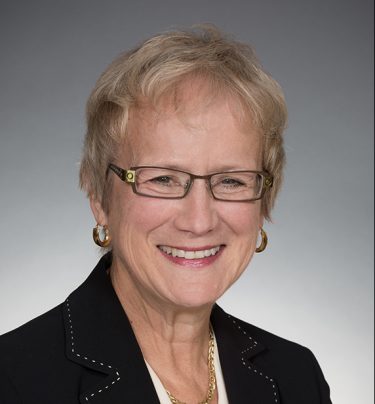Careers in research
Research Intramural Funding Program grants help launch nursing careers in research
Dr. Fran Lewis researches families impacted by cancer and has developed a new paradigm of care that focuses on treating cancer as a family illness and equipping them with manageable ways to cope.
 Oct. 11, 2023 – When Dr. Fran Lewis, RN, MN, PhD, FAAN, a UW Medical Center Endowed Professor of Nursing in the Department of Child, Family, and Population Health Nursing at University of Washington School of Nursing, began her career as a nurse scientist in the 1980s, she had ample expertise and experience gained from Stanford, Harvard, and Johns Hopkins Universities. She needed funding, however, before she could get started researching families impacted by serious medical illness.
Oct. 11, 2023 – When Dr. Fran Lewis, RN, MN, PhD, FAAN, a UW Medical Center Endowed Professor of Nursing in the Department of Child, Family, and Population Health Nursing at University of Washington School of Nursing, began her career as a nurse scientist in the 1980s, she had ample expertise and experience gained from Stanford, Harvard, and Johns Hopkins Universities. She needed funding, however, before she could get started researching families impacted by serious medical illness.
Dr. Lewis acquired funds through seed money to start, but the Research Intramural Funding Program (RIFP) grants she received, with contributions from the the de Tornyay Center for Healthy Aging, has led to many studies, hundreds of publications, and more funding from the National Institute of Health, the Department of Defense, and foundations.
“It was essential in launching a multibranched career in multiple directions,” said Dr. Lewis. “Every RIFP grant led to NIH grants, preliminary studies, opportunities to tell reviewers, and the chance to become a tenured track professor.”
With the RIFP funds, Dr. Lewis conducted descriptive and intervention studies to generate theory-based, population informed ways to counsel diagnosed patients, their spouse caregivers, and dependent children impacted by both early and late-stage cancer.
“My team and I created a new paradigm to focus on cancer care in the household family,” said Dr. Lewis. “In targeted ways, our work equips them with skills on how to talk about cancer and manage the emotional and physical aspects of it together while concurrently diminishing the threat of the illness in their families.”
During a current clinical trial, Dr. Lewis’s team led a counseling session with a family in which the dad had been diagnosed with non-curable cancer. His 14-year-old daughter was disengaged and not asking questions. The silence indicated to him that she was doing okay. But she wasn’t.
“He learned from the program that, going forward, he was going to be a detective of her feelings by uncovering her feelings and discovering ways to comfort her,” shared Dr. Lewis.
An RIFP-funded descriptive study grant application also taught Dr. Lewis that grants are not just about getting the money. She received helpful diagnostic feedback throughout the RIFP review process that strengthened her studies in ways that helped further the science.
RIFP grants can also lead to publications. During clinical trials of advanced cancer, Dr. Lewis was studying a couple affected by ovarian cancer, which was already advanced and incurable. It didn’t lead to a clinical trial, but it did lead to the published article, “Taking care of her: A pilot feasibility study of a caregiver intervention for women with advanced stage ovarian cancer,” in the Journal of Cancer Therapy.
“The RIFP is essential. It creates a safe space to learn how to write grants, obtain diagnostic feedback, and to move the science forward,” said Dr. Lewis.
At the time that Dr. Lewis started her research, she had the framework and ideology but not the practical research questions, measurements, assessments, and clinical evidence. She began developing connections with physicians who could refer their patients to her studies.
One of the challenges Dr. Lewis faced at the beginning was getting the physicians on board, to help them understand that cancer is a family illness and to see the value in spouse caregiver intervention. One physician questioned the need given that 50% of marriages end in divorce. For Dr. Lewis, it didn’t matter. She would want to provide the same services anyway.
“That is the way nurse scientists think,” said Dr. Lewis. “We build on strengths.”
Over the course of 25 years, Dr. Lewis’s research has helped thousands of families increase their capacity to cope with parental cancer. Physicians affectionately call Dr. Lewis “Franny,” and want all their patients to come into her trials.
She’s also built a strong research team, carefully balancing the pull between the heart and objectivity. Working with families experiencing cancer can take an emotional toll. Dr. Lewis challenges her team to practice self-care to avoid biased research results.
“We don’t introduce bias by thinking, ‘poor families,’ as they struggle with cancer diagnoses,” said Dr. Lewis. We want to be objective and informed.
Dr. Lewis’s goal is to help families thrive as individuals and as a family.
Reflecting on her career in research, Dr. Lewis shared, “The best thing about being a scientist is to discover — not to prove, but to discover — and then to implement those discoveries into actual clinical practice and programs.”
Due to the generosity of supporters, the UW Office of Nursing Research (ONR) offers two to three RIFP awards every year. Grants are issued twice a year and provide up to $25,000 of funding over two years. Since 2010, the RIFP program has provided nearly 60 UW School of Nursing researchers with almost $1,000,000 in pilot funding. Faculty can visit the ONR intranet for the RIFP manual and application materials.
– Jennifer Hunt